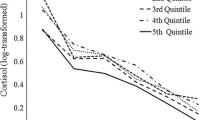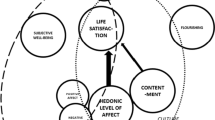Abstract
Research shows that people use their current mood along with other sources of information to assess their overall life satisfaction. Therefore, it has been assumed that the positive relationship between affective well-being and life satisfaction means that affective well-being influences life satisfaction and not vice versa. However, this assumption has not been rigorously tested in within-person analyses. Existing empirical evidence suggests that life satisfaction may also influence future affective experiences. The purpose of the present study was to examine the longitudinal within-person relationships between the components of affective well-being (i.e., positive and negative affect) and life satisfaction. The study used a sample of adults from the German Aging Survey collected at 5 time points over a 13-year period (N = 12,216, baseline age ≈ 60 years). The results of the random intercept cross-lagged panel model showed that changes in affective well-being predicted subsequent changes in life satisfaction. Changes in life satisfaction predicted subsequent changes in positive affect significantly and in negative affect marginally. This study provides insight into the direction of the long-term relationship between affective well-being and life satisfaction and highlights the importance of within-person analyses in understanding the relationships between these variables.

Similar content being viewed by others
Data Availability
The DEAS data and materials are publicly available at https://www.dza.de/en/research/fdz/german-ageing-survey.
References
Adey, P. (2005). Issues arising from the long-term evaluation of cognitive acceleration programs. Research in Science Education, 35(1), 3–22. https://doi.org/10.1007/s11165-004-3430-5.
Asendorpf, J. B. (2021). Modeling developmental processes. In J. F. Rauthmann (Ed.), The handbook of personality dynamics and processes (pp. 815–835). Elsevier Academic Press. https://doi.org/10.1016/B978-0-12-813995-0.00031-5.
Blore, J. D., Stokes, M. A., Mellor, D., Firth, L., & Cummins, R. A. (2010). Comparing multiple discrepancies theory to affective models of subjective wellbeing. Social Indicators Research, 100(1), 1–16. https://doi.org/10.1007/s11205-010-9599-2.
Busseri, M. A. (2014). Toward a resolution of the tripartite structure of subjective well-being. Journal of Personality, 83(4), 413–428. https://doi.org/10.1111/jopy.12116.
Busseri, M. A. (2018). Examining the structure of subjective well-being through meta-analysis of the associations among positive affect, negative affect, and life satisfaction. Personality and Individual Differences, 122, 68–71. https://doi.org/10.1016/j.paid.2017.10.003.
Busseri, M. A., & Newman, D. B. (2023). Happy days: Resolving the structure of daily subjective well-being, between and within individuals. Social Psychological and Personality Science. https://doi.org/10.1177/19485506221125416.
Busseri, M. A., & Quoidbach, J. (2022). The structure of everyday happiness is best captured by a latent subjective well-being factor. Journal of Research in Personality, 96, 104177. https://doi.org/10.1016/j.jrp.2021.104177.
Busseri, M. A., & Sadava, S. W. (2011). A review of the tripartite structure of subjective well-being: Implications for conceptualization, operationalization, analysis, and synthesis. Personality and Social Psychology Review, 15(3), 290–314. https://doi.org/10.1177/1088868310391271.
Coffey, J. K., Warren, M. T., & Gottfried, A. W. (2015). Does infant happiness forecast adult life satisfaction? Examining subjective well-being in the first quarter century of life. Journal of Happiness Studies, 16(6), 1401–1421. https://doi.org/10.1007/s10902-014-9556-x.
Cohn, M. A., Fredrickson, B. L., Brown, S. L., Mikels, J. A., & Conway, A. M. (2009). Happiness unpacked: Positive emotions increase life satisfaction by building resilience. Emotion, 9(3), 361–368. https://doi.org/10.1037/a0015952.
Diener, E. (1994). Assessing subjective well-being: Progress and opportunities. Social Indicators Research, 31, 103–157.
Diener, E. (2012). New findings and future directions for subjective well-being research. American Psychologist, 67(8), 590–597. https://doi.org/10.1037/a0029541.
Diener, E., Emmons, R. A., Larsen, R. J., & Griffin, S. (1985). The satisfaction with Life Scale. Journal of Personality Assessment, 49(1), 71–75. https://doi.org/10.1207/s15327752jpa4901_13.
Diener, E., Wirtz, D., Biswas-Diener, R., Tov, W., Kim-Prieto, C., Choi, D., & Oishi, S. (2009). New measures of well-being. In E. Diener (Ed.), Assessing well-being: The collected works of Ed Diener (pp. 247–266). Springer Science + Business Media. https://doi.org/10.1007/978-90-481-2354-4_12.
Folkman, S. (2008). 2008/01/01). The case for positive emotions in the stress process. Anxiety Stress & Coping, 21(1), 3–14. https://doi.org/10.1080/10615800701740457.
Fredrickson, B. L. (2001). The role of positive emotions in positive psychology: The broaden-and-build theory of positive emotions. American Psychologist, 56(3), 218–226. https://doi.org/10.1037/0003-066X.56.3.218.
Geiser, C. (2020). Longitudinal structural equation modeling with Mplus: A latent state-trait perspective. Guilford publications.
Hamaker, E. L. (2023). The within-between dispute in cross-lagged panel research and how to move forward. Psychological Methods. https://doi.org/10.1037/met0000600.
Hamaker, E. L., Kuiper, R. M., & Grasman, R. P. P. P. (2015). A critique of the cross-lagged panel model. Psychological Methods, 20(1), 102–116. https://doi.org/10.1037/a0038889.
Helliwell, J. F., & Huang, H. (2014). New measures of the costs of unemployment: Evidence from the subjective well-being of 3.3 million americans. Economic Inquiry, 52(4), 1485–1502. https://doi.org/10.1111/ecin.12093.
Joshanloo, M. (2019). Cultural religiosity as the moderator of the relationship between affective experience and life satisfaction: A study in 147 countries. Emotion, 19(4), 629–636. https://doi.org/10.1037/emo0000469.
Joshanloo, M. (2022a). Longitudinal relations between depressive symptoms and life satisfaction over 15 years. Applied Research in Quality of Life, 17(5), 3115–3130. https://doi.org/10.1007/s11482-022-10055-x.
Joshanloo, M. (2022b). Reciprocal relationships between personality traits and psychological well-being. British Journal of Psychology, 114(1), 54–69. https://doi.org/10.1111/bjop.12596.
Joshanloo, M., & Blasco-Belled, A. (2023). Reciprocal associations between depressive symptoms, life satisfaction, and eudaimonic well-being in older adults over a 16-year period. International Journal of Environmental Research and Public Health, 20(3), 2374. https://doi.org/10.3390/ijerph20032374.
Karandashev, V. (2021). Cultural models of emotions. Springer International Publishing.
Klaus, D., Engstler, H., Mahne, K., Wolff, J. K., Simonson, J., Wurm, S., & Tesch-Römer, C. (2017). Cohort profile: The German ageing survey (DEAS). International Journal of Epidemiology, 46(4), 1105–1105g. https://doi.org/10.1093/ije/dyw326.
Kline, R. B. (2015). Principles and practice of structural equation modeling. Guilford publications.
Lansford, J. E. (2018). A lifespan perspective on subjective well-being. In E. Diener, S. Oishi, & L. Tay (Eds.), Handbook of well-being. DEF Publishers. DOI:nobascholar.com.
Lucas, R. E. (2023). Why the cross-lagged panel model is almost never the right choice. Advances in Methods and Practices in Psychological Science, 6(1). https://doi.org/10.1177/25152459231158378.
Luhmann, M., Lucas, R. E., Eid, M., & Diener, E. (2013). The prospective effect of life satisfaction on life events. Social Psychological and Personality Science, 4(1), 39–45. https://doi.org/10.1177/1948550612440105.
Metler, S. J., & Busseri, M. A. (2017). Further evaluation of the tripartite structure of subjective well-being: Evidence from longitudinal and experimental studies. Journal of Personality, 85(2), 192–206. https://doi.org/10.1111/jopy.12233.
Moneta, G. B., Vulpe, A., & Rogaten, J. (2012). Can positive affect undo negative affect? A longitudinal study of affect in studying. Personality and Individual Differences, 53(4), 448–452. https://doi.org/10.1016/j.paid.2012.04.011.
Orth, U., Clark, D. A., Donnellan, M. B., & Robins, R. W. (2021). Testing prospective effects in longitudinal research: Comparing seven competing cross-lagged models. Journal of Personality and Social Psychology, 120(4), 1013–1034. https://doi.org/10.1037/pspp0000358.
Orth, U., Meier, L. L., Bühler, J. L., Dapp, L. C., Krauss, S., Messerli, D., & Robins, R. W. (2022). Effect size guidelines for cross-lagged effects. Psychological Methods. https://doi.org/10.1037/met0000499.
Schimmack, U., Diener, E., & Oishi, S. (2002). Life satisfaction is a momentary judgment and a stable personality characteristic: The use of chronically accessible and stable sources. Journal of Personality, 70, 345–385.
Schwarz, N., & Strack, F. (1999). Reports of subjective well-being: Judgmental processes and their methodological implications. In D. Kahneman, E. Diener, & N. Schwarz (Eds.), Well-being: The foundations of hedonic psychology (pp. 61–84). Russell Sage Foundation.
Smyth, J. M., Zawadzki, M. J., Juth, V., & Sciamanna, C. N. (2017). Global life satisfaction predicts ambulatory affect, stress, and cortisol in daily life in working adults. Journal of Behavioral Medicine, 40(2), 320–331. https://doi.org/10.1007/s10865-016-9790-2.
Sorjonen, K., Nilsonne, G., Melin, B., & Ingre, M. (2023). Uncertain inference in random intercept cross-lagged panel models: An example involving need for cognition and anxiety and depression symptoms. Personality and Individual Differences, 201, 111925. https://doi.org/10.1016/j.paid.2022.111925.
Tan, J. J. X., Kraus, M. W., Carpenter, N. C., & Adler, N. E. (2020). The association between objective and subjective socioeconomic status and subjective well-being: A meta-analytic review. Psychological Bulletin, 146(11), 970–1020. https://doi.org/10.1037/bul0000258.
Tomyn, A. J., & Cummins, R. A. (2010). Subjective wellbeing and homeostatically protected mood: Theory validation with adolescents. Journal of Happiness Studies, 12(5), 897–914. https://doi.org/10.1007/s10902-010-9235-5.
Vogel, C., Klaus, D., Wettstein, M., Simonson, J., & Tesch-Römer, C. (2021). German Ageing Survey (DEAS). In D. Gu & M. E. Dupre (Eds.), Encyclopedia of Gerontology and Population Aging (pp. 2152–2160). Springer International Publishing. https://doi.org/10.1007/978-3-030-22009-9_1115.
Watson, D., Clark, L. A., & Tellegen, A. (1988). Development and validation of brief measures of positive and negative affect: The PANAS scales. Journal of Personality and Social Psychology, 54(6), 1063–1070. https://doi.org/10.1037/0022-3514.54.6.1063.
Winer, E. S., & Salem, T. (2016). Reward devaluation: Dot-probe meta-analytic evidence of avoidance of positive information in depressed persons. Psychological Bulletin, 142(1), 18–78. https://doi.org/10.1037/bul0000022.
Author information
Authors and Affiliations
Corresponding author
Ethics declarations
Ethical Approval
This study used secondary and public data provided by the German Centre of Gerontology. For more information about the dataset see https://www.dza.de/en/research/fdz/german-ageing-survey.
Conflict of Interest
The author declares that they have no conflicts of interest.
Additional information
Publisher’s Note
Springer Nature remains neutral with regard to jurisdictional claims in published maps and institutional affiliations.
Rights and permissions
Springer Nature or its licensor (e.g. a society or other partner) holds exclusive rights to this article under a publishing agreement with the author(s) or other rightsholder(s); author self-archiving of the accepted manuscript version of this article is solely governed by the terms of such publishing agreement and applicable law.
About this article
Cite this article
Joshanloo, M. Thirteen Years of Subjective Well-Being: Within-Person Association between Positive Affect, Negative Affect, and Life Satisfaction. Int J Ment Health Addiction (2023). https://doi.org/10.1007/s11469-023-01223-7
Accepted:
Published:
DOI: https://doi.org/10.1007/s11469-023-01223-7




